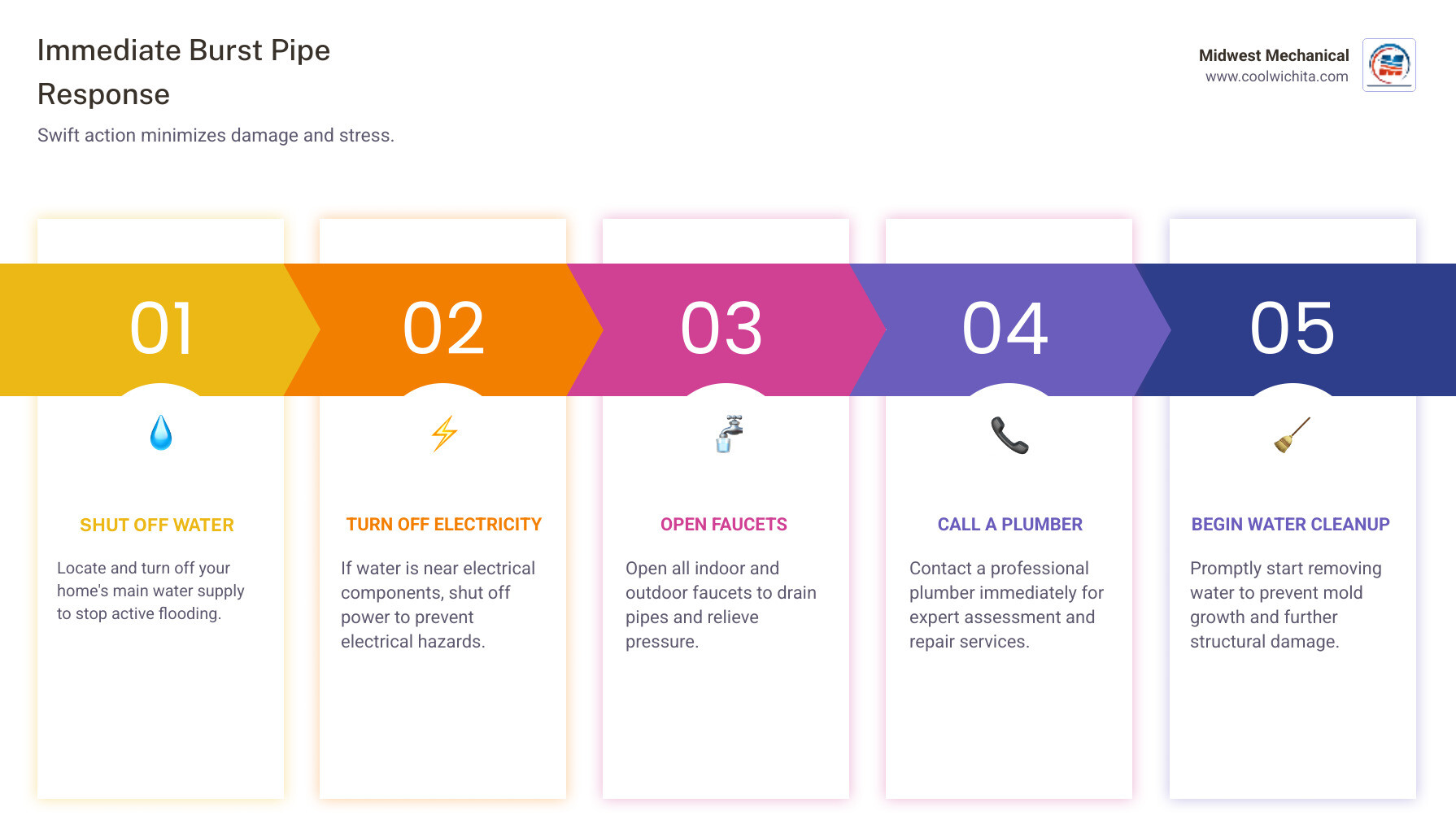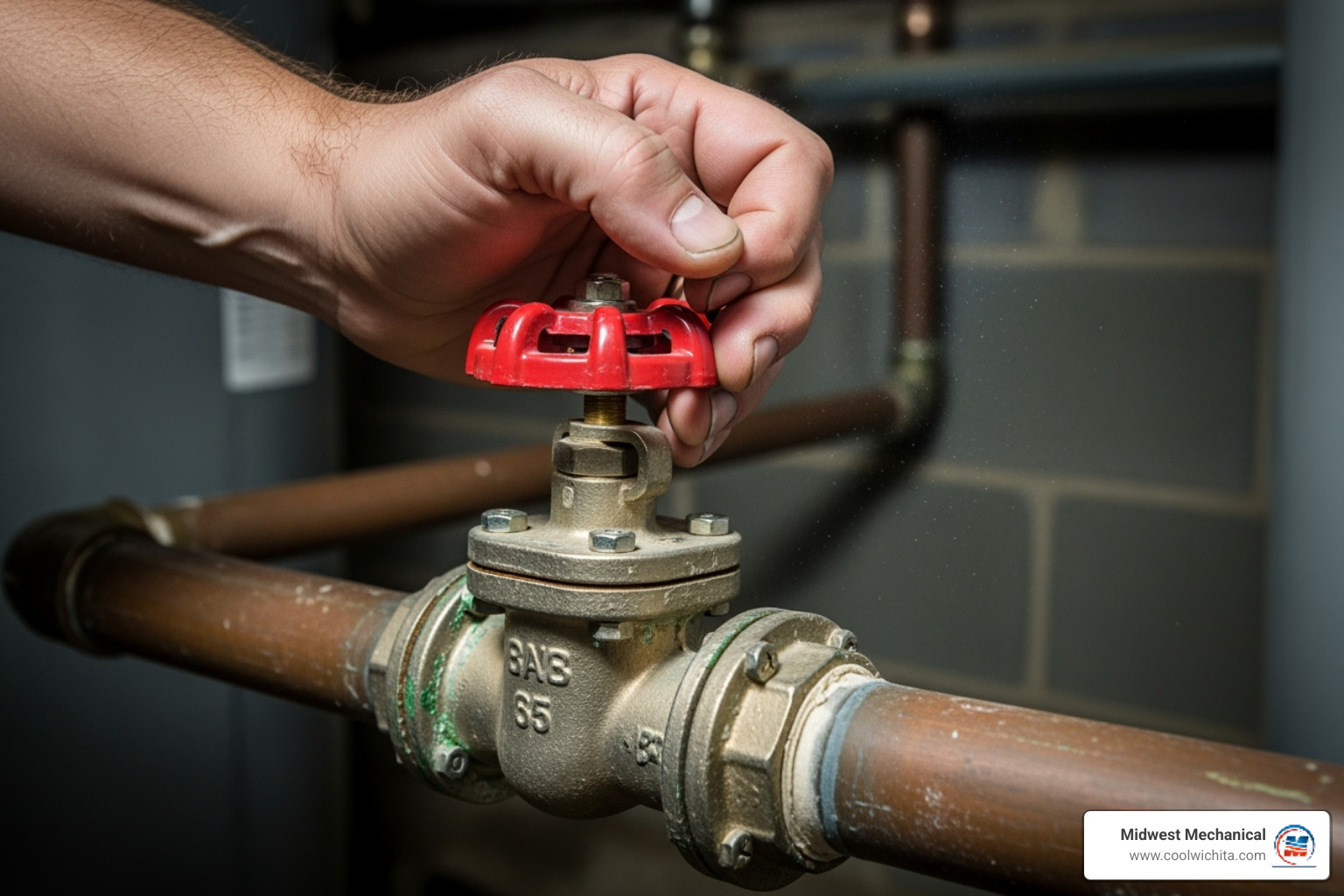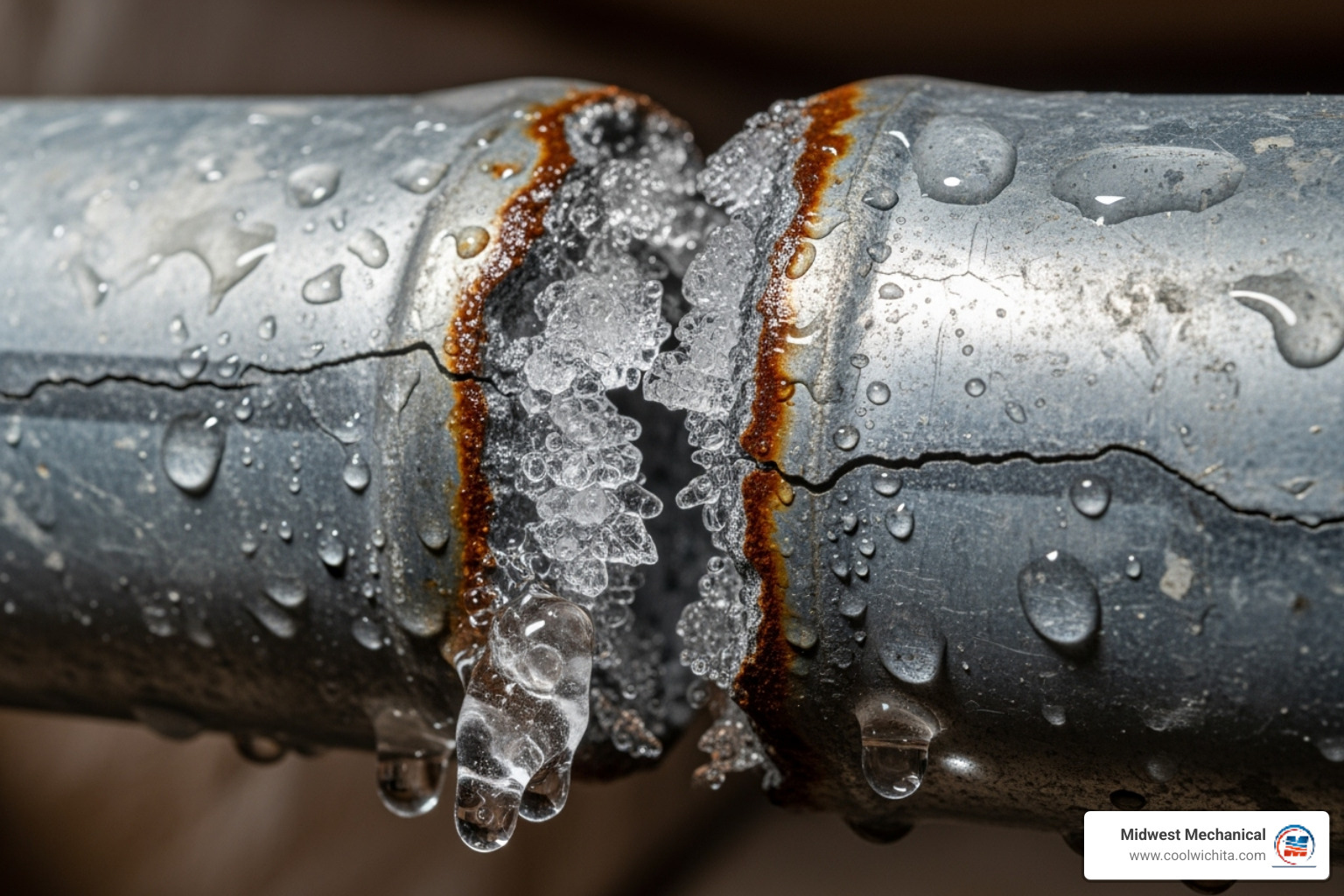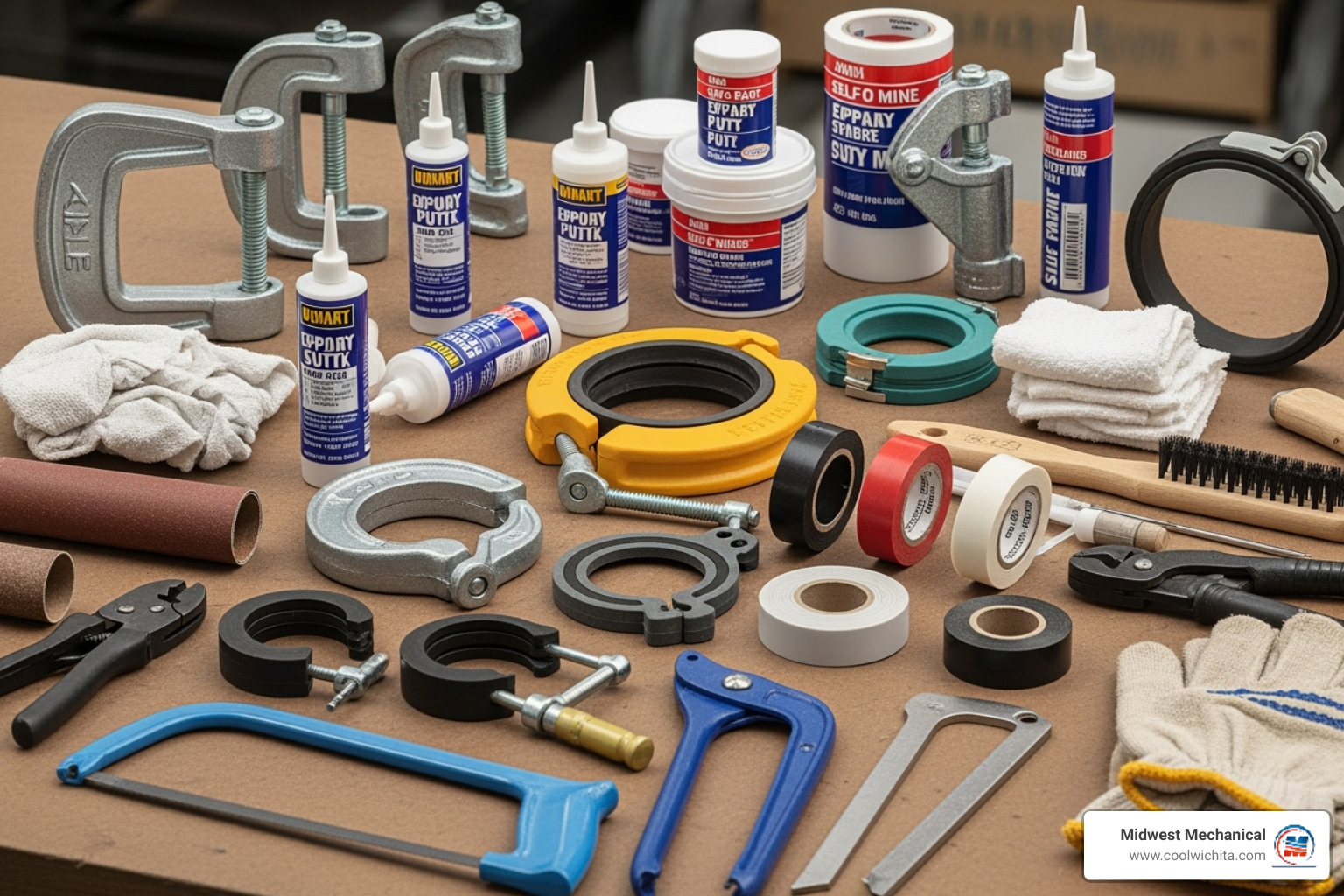When Disaster Strikes: The Reality of Burst Pipes
Burst pipe repair becomes an urgent priority when water starts gushing from your walls or flooding your basement. Based on industry data, a burst pipe can cause more than $5,000 in damage, making quick action essential for Wichita homeowners.
Immediate Steps for Burst Pipe Repair:
- Shut off the main water supply - This stops additional flooding
- Turn off electricity if water is near electrical components
- Open all faucets to drain remaining water and relieve pressure
- Call a professional plumber for proper repairs
- Document damage with photos for insurance claims
- Begin water cleanup immediately to prevent mold growth
Water damage and freezing account for almost 22 percent of all homeowners insurance claims. The average claim to repair water damage caused by frozen pipes runs roughly $15,000, with extreme cases reaching $70,000 or more.
As one homeowner finded, "I woke up to a burst pipe behind the water heater, with water all over the garage floor." This scenario plays out frequently in Kansas winters when temperatures drop below the critical 20°F threshold.
The key to minimizing damage lies in your immediate response. Every minute counts when water is actively flowing into your home's structure, potentially causing permanent damage to walls, floors, and personal belongings.

First Steps: What to Do Immediately When a Pipe Bursts
Picture this: you're enjoying a quiet morning when suddenly you hear the unmistakable sound of rushing water where it shouldn't be. Your heart sinks as you realize you're facing every homeowner's nightmare – a burst pipe. Don't panic! While it feels overwhelming, taking the right steps immediately can save you thousands in damage and headaches down the road.
The moment you find a burst pipe repair emergency, your quick thinking becomes your home's best defense. Water damage can escalate rapidly, turning a manageable situation into a costly disaster. But here's the good news: you have more control than you might think.
Locate and Shut Off the Main Water Valve
Your absolute first mission is finding and shutting off your home's main water supply. Think of this as hitting the emergency brake – it's the single most important action you can take to stop the flood in its tracks.
Your main water shut-off valve is usually located where the water line enters your house. Check your basement first, then try the utility closet, garage, or look outside near your water meter. Once you spot it, turn the valve clockwise until it stops. Don't worry if it's a bit stiff – older valves sometimes need a firm hand.
Here's a pro tip that many homeowners miss: after shutting off the main supply, open all your faucets throughout the house. Start with the lowest ones, like basement sinks or outdoor spigots. This isn't just busy work – you're draining the remaining water from your pipes and relieving pressure in the system.

Why does this matter? Releasing pressure helps prevent additional pipes from bursting and makes the repair process much safer. You'll know you've succeeded when that terrifying gushing sound fades to a manageable drip.
Assess Safety and Call for Help
Now take a deep breath – you've stopped the immediate crisis. But before you roll up your sleeves, let's talk safety. Water and electricity make dangerous dance partners, so your next step is checking for electrical hazards.
If water is anywhere near outlets, appliances, or your electrical panel, stay away until you've turned off the power to that area. When in doubt, flip your main electrical breaker. It's better to sit in the dark for a while than risk electrocution.
Once you've ensured everyone's safety, it's time to call a professional plumber. While you might feel tempted to tackle this yourself, most burst pipes need expert attention. Professional plumbers bring the right tools, experience, and knowledge to handle everything from major bursts to tricky hidden pipe repairs.
Don't forget to grab your phone and start documenting the damage. Take photos and videos of everything – the burst pipe, water damage, soaked belongings, and affected walls or floors. Your insurance claim will thank you later, and having thorough documentation makes the process much smoother.
For immediate help with water damage, you'll want to contact a water mitigation specialist quickly. These professionals specialize in properly drying out your home to prevent mold growth and structural damage. Your plumber can often recommend a trusted water mitigation company.
Every minute counts when it comes to water damage. The faster you act, the better your chances of avoiding expensive secondary problems down the line.
Identifying the Problem: Signs and Common Causes of a Burst Pipe
Sometimes a burst pipe repair becomes obvious when water starts gushing from your walls. But more often than not, pipes are sneaky troublemakers that cause damage quietly behind the scenes. Learning to recognize the warning signs can save you thousands of dollars and countless headaches.
Think of your home as constantly communicating with you. Those mysterious water stains, unusual sounds, or that sudden spike in your water bill? Your house is trying to tell you something important.
Telltale Signs of a Hidden Leak
Hidden leaks are like silent saboteurs, slowly wreaking havoc before announcing their presence. The key is knowing what to look for before a small problem becomes a big disaster.
Damp drywall and water stains are often the first visual clues. You might notice yellowish or brownish patches on your ceiling, or walls that feel soft and spongy to the touch. Warped floors that buckle or feel bouncy underfoot are another dead giveaway that water is where it shouldn't be.
Your ears can be just as valuable as your eyes. Listen for unexplained sounds like dripping, trickling, or hissing when no faucets are running. That persistent sound in your walls isn't your imagination – it's water escaping from damaged pipes.
Ceiling stains and puddles that appear without explanation are obvious red flags. But don't overlook subtler signs like a drop in water pressure throughout your home or that persistent musty smell that won't go away, especially in basements or utility areas.
One of the most telling signs is a high water bill that arrives without warning. If your usage habits haven't changed but your bill has skyrocketed, you're likely paying for water that's flowing somewhere other than your faucets and fixtures.
If you're hearing unusual sounds from your pipes, our guide on Knocking Pipes in Bel Aire can help you understand what those noises might mean.
Why Do Pipes Burst?
Understanding why pipes fail helps you prevent future emergencies. Pipes don't just randomly decide to burst – there's always an underlying cause.
Freezing temperatures are the number one culprit in our Kansas climate. When water freezes, it expands with incredible force, creating pressure that even the strongest pipes can't withstand. The critical temperature threshold is around 20°F, which we unfortunately see quite often during our winters.

Corrosion is a slower but equally destructive enemy. Over time, especially in old pipes, the metal deteriorates from the inside out. What starts as a tiny weak spot eventually becomes a full rupture under normal water pressure.
High water pressure might sound like a good thing, but your pipes disagree. Excessive pressure stresses the entire plumbing system, particularly at joints and connections where pipes are most vulnerable.
Clogs can create dangerous backups that put tremendous pressure on pipe walls. When water has nowhere to go, it pushes back with force that can cause catastrophic failures.
For outdoor plumbing, tree roots are relentless invaders. They seek out moisture, find tiny cracks, and grow until they completely crush or rupture pipes. It's nature versus plumbing, and nature often wins.
Sometimes the problem is simply age and wear. Even the best-installed pipes have a lifespan, and older materials become brittle and prone to failure over time.
Want to know more about protecting your pipes from freezing? Check out our detailed guide on How Cold Does It Have to Be for Pipes to Freeze? for practical prevention tips.
Your Guide to Professional and DIY Burst Pipe Repair
When you're facing a burst pipe repair situation, you have two main paths: roll up your sleeves for a DIY approach or call in the professionals. The trick is knowing which route makes sense for your specific situation and skill level.
Think of it like this – some repairs are like putting a band-aid on a scraped knee, while others require surgery. Understanding the difference can save you time, money, and a lot of frustration.
Temporary DIY Fixes for Minor Leaks
If you're dealing with a small leak or pinhole – especially while waiting for a plumber to arrive – a temporary fix can be your best friend. These solutions won't win any beauty contests, but they'll stop the water from causing more damage to your home.
Pipe clamps are probably your most reliable quick fix. These handy devices combine a rubber gasket with a metal clamp that wraps around the damaged section. Just position the rubber over the leak and tighten the clamp until the water stops flowing. It's like giving your pipe a temporary hug.
For a more improvised approach, grab some rubber sheeting (an old inner tube works great) and wrap it tightly around the leak. Secure it with several hose clamps, making sure they're snug. This creates a waterproof barrier that can hold for quite a while.
Epoxy putty is another lifesaver for small holes. This two-part compound hardens quickly when you mix it together. Clean the pipe surface first, then mold the putty around the leak. Once it sets, you'll have a tough, waterproof seal that can last until permanent repairs are made.
Don't overlook self-fusing silicone tape either. This clever material bonds to itself as you wrap it around the pipe, creating a strong seal without any adhesive. Just stretch it tight as you wrap, and it'll form a watertight barrier.

Keep these essential tools handy for emergency repairs: pipe repair clamps, rubber sheeting, hose clamps, epoxy putty, self-fusing silicone tape, rags, a bucket, a pipe cutter for clean cuts, and steel wool for cleaning pipe surfaces. Having this kit ready can turn a disaster into a manageable situation.
DIY vs. Professional Burst Pipe Repair: Making the Right Call
Here's where things get interesting. While temporary fixes are great for emergencies, permanent burst pipe repair requires more thought. The decision between DIY and professional help often comes down to location, complexity, and your comfort level with tools.
| Factor | DIY Approach | Professional Repair |
|---|---|---|
| Cost | Lower upfront cost, mainly materials | Higher cost but includes expertise and warranty |
| Time | Can take several attempts and learning | Usually completed in one visit |
| Skill Level | Basic repairs only, like accessible leaks | Complex jobs requiring soldering or hidden pipe access |
| Best For | Small leaks, exposed pipes, temporary fixes | Major bursts, wall/foundation pipes, permanent solutions |
Simple repairs you might tackle yourself include replacing a section of exposed pipe with push-to-connect fittings. These modern connectors are incredibly user-friendly – just cut out the damaged section, slide the fittings on, and push the new pipe into place. No soldering required, and they work great with both PEX pipes and copper pipes.
However, some situations definitely call for professional help. If the burst is behind a wall, under your foundation, or involves your main water line, it's time to call the experts. Major bursts that flood your basement or damage structural elements are also beyond most homeowners' abilities.
Soldering copper pipes is another skill that takes practice to master. While it's not impossible to learn, a poorly soldered joint can fail weeks or months later, potentially causing even more damage than the original problem.
When choosing materials for repairs, consider the pros and cons of different options. Our guide on Explore Home Piping Materials: Pros and Cons can help you make informed decisions about what works best in your home.
For those ready to tackle a DIY repair, invest in quality tools like a good Pipe Cutter. Clean cuts make all the difference in creating leak-free connections.
There's no shame in knowing your limits. A small mistake during burst pipe repair can turn into a much bigger and more expensive problem. When in doubt, it's always better to call a professional plumber who can get the job done right the first time.
Customer Testimonials
Hear from satisfied customers who trust us for reliable HVAC and plumbing service across Wichita.






Plus, the technician, Lee was very professional, knowledgeable and informative.
We will definitely be doing business with them sometime again in the past.


I'm prompt to my appointment. Thank you Midwest Mechanical.









We have partnered with GoodLeap to offer flexible payment options for your project. GoodLeap uses a soft credit check until funding and the highest score from all 3 bureaus to see if you qualify. It also takes just a few minutes to get started.




Service Areas
.svg)



